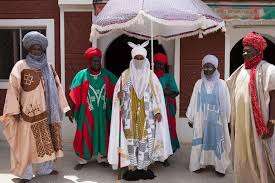- Class: Primary 2
- Term: 3rd Term
- Week: 1
- Age: 7 years
- Duration: 40 minutes
- Subject: National Value Education
- Curriculum Theme: Civic Education
- Previous Lesson: Duties of community leaders and the reward
- Topic: The community leaders – title holders
- Content/Learning Area: Yoruba – Oba; Hausa – Emir or Sultan; Igbo – Eze or Obi; Benin – Enoge; Nupe – Etsu; Ebira – Ohinoyi, etc.
Performance Objectives:
By the end of the lesson, pupils should be able to:
- Cognitive domain: Define title holders & Identify at least two title holders in different communities and describe their roles.
- Affective domain: Appreciate the importance of title holders in maintaining cultural heritage and order.
- Psychomotor domain: Create a simple drawing or emblem representing one title holder.
- Social Domain: Discuss respectfully the differences and similarities between title holders in various communities.
Reference Materials:
The following resources were used in planning this lesson:
- 9 – Years Basic Education Curriculum
- Abuja Educational Resource Centre Scheme of work
- NAPPS National Unified Scheme of Work
- Online Information from Wikipedia – Nigerian traditional rulers
Instructional Materials:
The teacher will teach this lesson with the aid of:
- Pictures of different community title holders
- Cultural emblems and regalia
- Flashcards
- A world map
Rationale for the Lesson:
Understanding the roles and significance of community leaders in various Nigerian cultures helps pupils appreciate diversity and fosters a sense of respect and unity among different ethnic groups.
Prerequisite/Previous Knowledge:
Pupils are expected to recall the duties of community leaders from the previous lesson.
INSTRUCTIONAL PROCEDURES:
Learning Area: The community leaders – title holders
To deliver this lesson, the teacher will adopt the following steps:
| Content Development | Time | Teaching Method | Teaching Strategy | Teacher’s Activity | Pupil’s Activity | Learning Point |
|---|---|---|---|---|---|---|
| Step 1: Introduction | 5 mins | Lecture | Set induction | Greet pupils and introduce topic with a short story | Listen and respond to questions | Engage interest and activate prior knowledge |
| Step 2: Explanation of Roles | 10 mins | Discussion | Interactive teaching | Explain the roles of title holders using flashcards | Ask and answer questions about different title holders | Understand the roles of various community leaders |
| Step 3: Cultural Significance | 10 mins | Group work | Collaborative learning | Discuss the cultural importance of title holders | Group discussion on what they think about title holders | Appreciate the cultural diversity and significance |
| Step 4: Creative Activity | 10 mins | Hands-on | Learning by doing | Guide pupils in creating emblems | Create simple drawings or emblems of title holders | Express understanding through creativity |
| Step 5: Recap and Conclusion | 5 mins | Questioning | Review | Recap the lesson, emphasizing key points | Respond to recap questions | Reinforce learned content |
Classroom Note:
The Community Leaders – Title Holders
Title holders are respected individuals in a community who hold specific roles and responsibilities, such as chiefs or elders, and help lead and guide their community.
Example of some title holders in Nigeria
- In Yoruba culture, the title holder is called “Oba”.
- The Hausa community has title holders known as “Emir” or “Sultan”.
- In Igbo lands, they are referred to as “Eze” or “Obi”.
- The Benin people call their leaders “Enoge”.
- “Etsu” is a title holder among the Nupe.
- The Ebira people have a leader known as “Ohinoyi”.
These leaders play important roles in their communities, helping to maintain order and preserve the culture.
Lesson Evaluation:
To evaluate the learning, the teacher asks pupils to:
- Name two title holders and their communities.
- Draw and color the emblem of any one title holder.
- Describe one role of a title holder in their community.
- Explain why it is important to respect community leaders.
Note for teachers using my lesson plan:
Hi there, remember that I didn’t make this lesson plan with any particular class or teacher in mind and I tried as much as possible with my experience and expertise to deliver this plan in a standard and effective style utilizing the best strategy and methods. Nevertheless, you are free to customize the lesson content, teaching methods, timing and pupil activities to suit your teaching style, pupils comprehension, curriculum, and resources available to you. Happy teaching!





